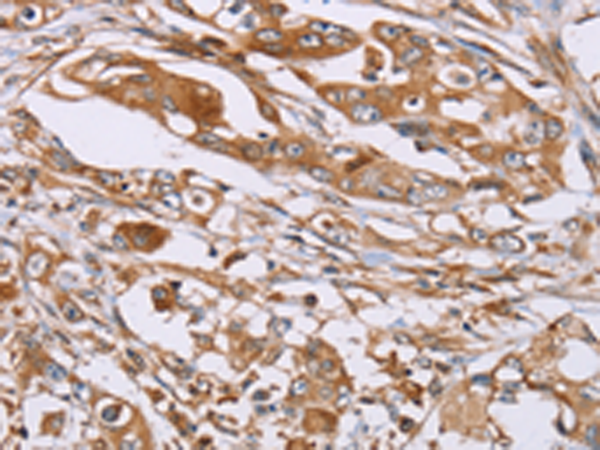

| WB | 1/500-1/2000 | Human,Mouse,Rat |
| IF | 咨询技术 | Human,Mouse,Rat |
| IHC | 1/25-1/100 | Human,Mouse,Rat |
| ICC | 技术咨询 | Human,Mouse,Rat |
| FCM | 咨询技术 | Human,Mouse,Rat |
| Elisa | 1/2000-1/5000 | Human,Mouse,Rat |
| Aliases | OS-9; ERLEC2 |
| WB Predicted band size | 76 kDa |
| Host/Isotype | Rabbit IgG |
| Antibody Type | Primary antibody |
| Storage | Store at 4°C short term. Aliquot and store at -20°C long term. Avoid freeze/thaw cycles. |
| Species Reactivity | Human, Mouse |
| Immunogen | Fusion protein of human OS9 |
| Formulation | Purified antibody in PBS with 0.05% sodium azide and 50% glycerol. |
+ +
以下是关于OS9抗体的参考文献及其摘要概述:
1. **文献名称**:*OS-9 interacts with hypoxia-inducible factor 1α and prolyl hydroxylases to promote oxygen-dependent degradation of HIF-1α*
**作者**:Bernasconi R, et al.
**摘要**:该研究揭示了OS9蛋白通过结合缺氧诱导因子HIF-1α和脯氨酰羟化酶(PHDs),促进其氧依赖性降解,从而调控肿瘤细胞的缺氧应答通路。研究使用OS9抗体验证了其在ERAD途径中的关键作用。
2. **文献名称**:*High expression of OS-9 correlates with poor prognosis in colorectal cancer patients*
**作者**:Saito Y, et al.
**摘要**:通过免疫组化分析结直肠癌组织样本,发现OS9蛋白的高表达与患者总生存期缩短显著相关。OS9抗体的应用表明其可作为潜在预后标志物,可能通过促进致癌蛋白的稳定性驱动肿瘤进展。
3. **文献名称**:*OS-9 regulates the retrotranslocation of misfolded proteins from the endoplasmic reticulum*
**作者**:Hosokawa N, et al.
**摘要**:该研究证实OS9通过识别错误折叠蛋白(如突变型α1-抗胰蛋白酶),将其靶向至内质网膜复合体进行逆向转运,依赖OS9抗体的实验表明其在神经退行性疾病中可能影响错误折叠蛋白的清除效率。
4. **文献名称**:*Viral infection induces OS-9-mediated ER stress response and innate immune signaling*
**作者**:Zuber C, et al.
**摘要**:研究利用OS9抗体进行Western blot分析,发现病毒感染触发内质网应激时,OS9与IRE1α通路相互作用,增强未折叠蛋白反应(UPR)和抗病毒信号传导,揭示OS9在宿主免疫防御中的新机制。
以上文献从分子机制、疾病关联及技术应用层面展示了OS9抗体的研究价值。
OS9 antibody is a research tool targeting OS-9 (osteosarcoma amplified 9), a protein implicated in endoplasmic reticulum (ER)-associated degradation (ERAD). OS-9 functions as a key component of the ER quality control system, identifying misfolded glycoproteins and directing them for proteasomal degradation via interactions with ER-resident lectins and E3 ubiquitin ligases like HRD1. It plays roles in maintaining ER homeostasis, regulating protein folding, and responding to cellular stress. Dysregulation of OS-9 is linked to diseases such as cancer, neurodegenerative disorders, and diabetes.
OS9 antibodies are widely used to study OS-9 expression, localization, and function in biological samples. They are applied in techniques like Western blotting, immunofluorescence, and immunohistochemistry to investigate OS-9's involvement in pathological conditions. For example, OS-9 is overexpressed in certain cancers (e.g., glioblastoma, osteosarcoma), where it may promote tumor progression by modulating hypoxia-inducible factor (HIF) signaling or ER stress pathways. In neurodegenerative contexts, OS-9 variants are associated with inherited spastic paraplegia, highlighting its neuroprotective role. Researchers also utilize OS9 antibodies to explore therapeutic strategies targeting ERAD or stress-response pathways. Validated antibodies are critical for distinguishing OS-9 isoforms (OS-9-1 and OS-9-2) and ensuring specificity in experimental models. Its dual role as a disease biomarker and potential drug target underscores the importance of OS9 antibodies in both basic and translational research.
×